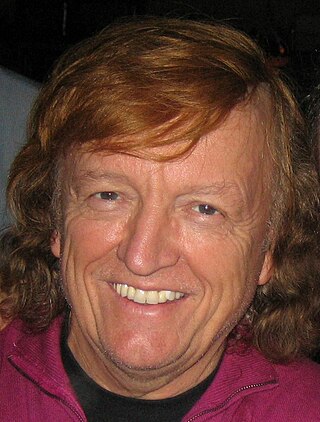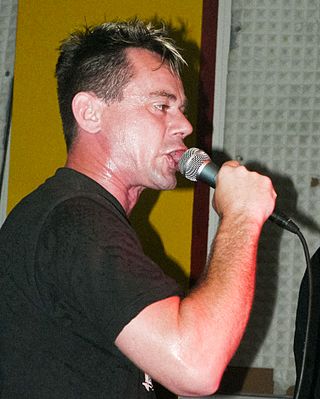Related Research Articles

Franz Reuther, known professionally as Frank Farian, was a German record producer and singer who founded the 1970s disco-pop group Boney M., the Latin pop band No Mercy, and the pop band Milli Vanilli. He frequently created vocal groups in which the publicised members merely lip-synced to songs sung by session performers. Farian owned the record label MCI and several subsidiaries. Over the course of his career, Farian sold over 850 million records and earned 800 gold and platinum certifications.

Hannes Wader is a German singer-songwriter ("Liedermacher"). He has been an important figure in German leftist circles since the 1970s, with his songs covering such themes as socialist, communist resistance to oppression in Europe and other places like Latin America, as well as peace (anti-war) songs. He both wrote new songs and played versions of older historical works.
"The Unquiet Grave" is an Irish / English folk song in which a young man's grief over the death of his true love is so deep that it disturbs her eternal sleep. It was collected in 1868 by Francis James Child as Child Ballad number 78. One of the more common tunes used for the ballad is the same as that used for the English ballad "Dives and Lazarus" and the Irish pub favorite "Star of the County Down".

Thomas Hübner, better known by his stage name Clueso, is a German singer, rapper, songwriter, and producer. His first album, Text und Ton, was released in 2001. Since then, he has released seven more albums, of which the last three—Stadtrandlichter (2014), Neuanfang (2016) and Handgepäck I (2018)—reached number 1 of the German Top 100.

Lena Valaitis is a Lithuanian–German schlager singer who had her greatest success during the 1970s and 1980s. She finished second at the 1981 Eurovision Song Contest.
Silvio Blatter is a Swiss writer.

Normahl is a German punk band formed in 1978 in Winnenden near Stuttgart by five high school students. Their music is upbeat and typically classified as punk pathetique as well as Deutschpunk. Their lyrics sometimes deals with themes like sex, drugs, and partying. However Normahl's songs also notably address left-political themes such as police violence, xenophobia, nationalism, anarchy, capitalism, and resistance to fascism, often in a humorous way.

The Fureys are an Irish folk band originally formed in 1974. The group consisted initially of four brothers who grew up in Ballyfermot, Dublin.
Die Flippers were a German Schlager group formed in 1964. They were one of the most successful Schlager groups of all time, and have been constantly recording and releasing new music since their self-titled debut album was released in 1970. They have released 45 albums, 5 of which have gone platinum, 24 gold. They have won 11 Goldene Stimmgabel awards in 1988, 1991, 1994, 1995, 1996, 1998, 1999, 2000, 2002, 2003 and 2004.

Senna Gammour, also known mononymously as Senna, is a German singer, television personality and presenter. She was a member of the girl group Monrose.

Reimar Oltmanns is a well-known journalist and author in Germany.

Anton Wilhelm Florentin von Zuccalmaglio was a German dialectologist, folklorist, folk-song collector, poet, and composer. Born in Waldbröl, he was one of six children born to politician and jurist Jakob Salentin von Zuccalmaglio and Clara Deycks. His brother Vinzenz Jakob von Zuccalmaglio was a successful writer and poet. The Von Zuccalmaglio family traced its ancestry to Italians who had settled in the Catholic Rhineland region of Germany in centuries past.
Ullrich Haupt was an American-born German actor. His father, also named Ullrich Haupt, was a German actor who worked in Hollywood films, but he returned to Germany following his father's death in 1931.
Volkslied is a genre of popular songs in German which are traditionally sung. While many of them were first passed orally, several collections were published from the late 18th century. Later, some popular songs were also included in this classification.

Liederjan is a north-German folk group. It originated as Tramps & Hawkers, which played Irish traditional music in the early 1970s. They gradually started playing German folk music, and in 1975 formed the group Liederjan.

Wolfgang Steinitz was a German linguist and folklorist. Through his rediscovery of hidden social commentary in traditional folk songs, he was an important pioneer of the German folk-revival in both East and West Germany. He researched the language and culture of the Ugric peoples of West Siberia, including the songs that form an important part of the tradition of this endangered ethnic group. Steinitz also left extensive work in other areas of linguistic studies.

"Kein schöner Land in dieser Zeit" is a popular Volkslied in German. It goes back to a song by Anton Wilhelm von Zuccalmaglio, first published in 1840 in a folk song collection. It gained popularity in the 1910s in the Wandervogel movement, and was later used by the Nazis and included in the Hitler Youth songbooks. It has been set to choral music and modern songs. The beginning of the first line has been used as the title of books, a play and television series.
Norbert Linke was a German composer and musicologist.
Günter Wewel was a German operatic bass and television presenter. Based at the Opernhaus Dortmund for decades, he performed 80 roles in Germany and Europe. He is known for presenting the television series Kein schöner Land, with more than 150 episodes from 1989 to 2007, which portrays regions in Europe, their landscape, people and folklore, the first such show filmed at the locations.
Kein schöner Land was a television series of musical entertainment about regions in Europe, aired by ARD from 1989 to 2007 in different intervals in evening programs. The subtitle Lieder, Landschaften, Musikanten specified its focus on songs, landscapes and musicians. It was presented by Günter Wewel, and produced by Saarländischer Rundfunk (SR).